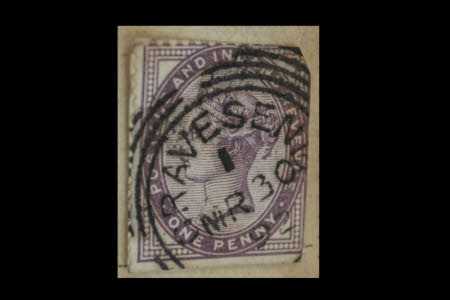Stamp
Category
Ephemera
Date
1892
Materials
paper, ink, glue
Measurements
23 x 20 mm
Order this imageCollection
Mr Straw's House, Nottinghamshire
NT 748711.29
Caption
Victoria (Alexandrina Victoria; 24 May 1819 – 22 January 1901) was Queen of the United Kingdom of Great Britain and Ireland from 20 June 1837 until her death. From 1 May 1876, she had the additional title of Empress of India. Victoria was the daughter of Prince Edward, Duke of Kent and Strathearn, the fourth son of King George IIl. Both the Duke of Kent and King George III died in 1820, and Victoria was raised under close supervision by her German-born mother Princess Victoria of Saxe-Coburg-Saalfeld. She inherited the throne aged 18, after her father's three elder brothers had all died, leaving no surviving legitimate children. The United Kingdom was already an established constitutional monarchy, in which the sovereign held relatively little direct political power. Privately, Victoria attempted to influence government policy and ministerial appointments; publicly, she became a national icon who was identified with strict standards of personal morality. Victoria married her first cousin, Prince Albert of Saxe-Coburg and Gotha, in 1840. Their nine children married into royal and noble families across the continent, tying them together and earning her the sobriquet "the grandmother of Europe". After Albert's death in 1861, Victoria plunged into deep mourning and avoided public appearances. As a result of her seclusion, republicanism temporarily gained strength, but in the latter half of her reign her popularity recovered. Her Golden and Diamond Jubilees were times of public celebration. Her reign of 63 years and 7 months is known as the Victorian era. It was a period of industrial, cultural, political, scientific, and military change within the United Kingdom, and was marked by a great expansion of the British Empire. She was the last British Monarch of the House of Hanover. Her son and successor, Edward VI, belonged to the House of Saxe-Coburg and Gotha, the line of his father.
Summary
Postage stamp - purple printed stamp depicting head of Queen Victoria in an oval frame, containing the words POSTAGE AND INLAND REVENUE ONE PENNY'. There is a heavy postal mark covering most f the surface 'GRAVESEND MR 30 92'.The stamp is on page 6 'BRITISH EMPIRE GREAT BRITAIN AND IRELAND', sixth stamp on fourth row.The stamp is kept in 'THE WORLD POSTAGE STAMP ALBUM' with blue book boards and two world globes front centre in black and white surrounded by a series of world stamp images. On the back in the centre printed in black are two crossed flags depicting the British flag above a globe. The album contains a hundred and forty five pages, plus an additional page added at the rear of 'United South Africa' taken from another album (record 748711.1).
Provenance
Straw collection bequeathed to The National Trust on the death in 1990 of William Straw.
